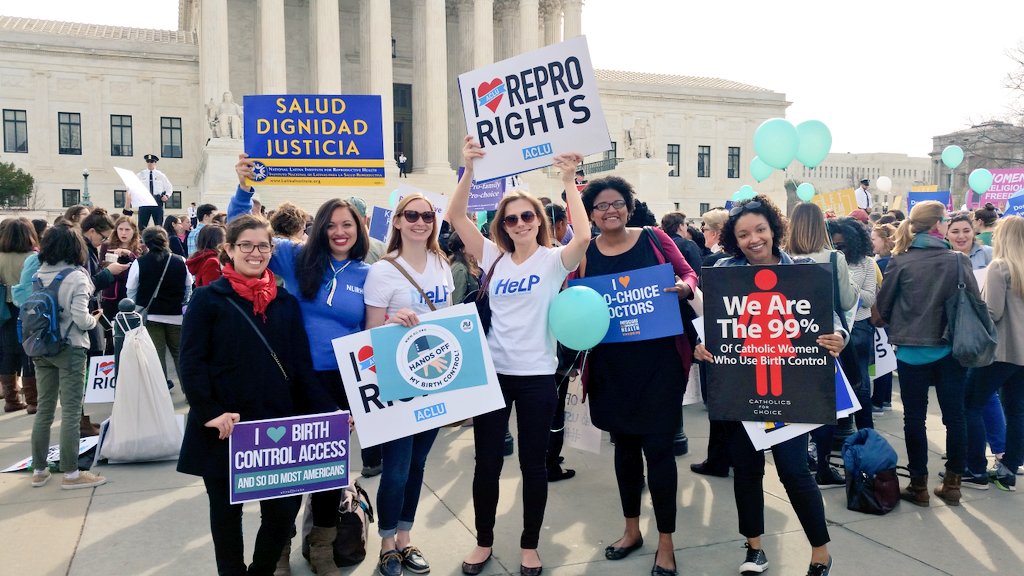The Supreme Court heard oral arguments in Zubik v. Burwell, a case about religious institutions’ right to opt out of covering contraception under the Affordable Care Act, on Wednesday (March 23). Some Christian groups, including those involved in this lawsuit, don’t want their employees to be offered contraceptive coverage, even if the organizations themselves aren’t directly involved in providing that coverage.
But the legal ground for denying their employees contraceptive coverage is shaky. This case, and others like it (including the Burwell v. Hobby Lobby decision) rely on the protections afforded by the Religious Freedom Restoration Act (RFRA), which was passed during President Clinton’s term in 1993. It was widely supported by both Democrats and Republicans.
RFRA has an interesting history. It was originally passed to prevent discrimination on the basis of religion. An ACLU representative explains in a 2015 op-ed:
The RFRA was passed in 1993 after two Native Americans were fired from their jobs and denied unemployment benefits because they used peyote, an illegal drug, in their religious ceremonies. The Supreme Court rejected a claim they had brought under the Free Exercise Clause of the First Amendment, but Congress disagreed with the justices and enacted the RFRA with near-unanimous support.
The ACLU supported the RFRA’s passage at the time because it didn’t believe the Constitution, as newly interpreted by the Supreme Court, would protect people such as Iknoor Singh, whose religious expression does not harm anyone else.
But the Hobby Lobby decision marked a new use of RFRA—instead of being used to protect a religious minority, it’s being used to allow institutions to limit their employees access to a health care service.
The ACLU representative explains why they are no longer supporting RFRA:
In the Hobby Lobby case last year, a Supreme Court majority blessed the use of the RFRA by businesses to deny employees insurance coverage for contraception, a benefit guaranteed by law, if those businesses object on religious grounds and there is some other means of furthering the government’s interests. Religiously affiliated nonprofit organizations such as universities are taking the argument further. They invoke the RFRA to argue not only that they should not have to provide insurance coverage for contraceptives, but also that they should not even have to notify the government that they refuse to do so because, they maintain, notification would trigger the government to intervene to ensure coverage.
In the states, legislators, governors and businesses are citing state religious freedom restoration acts to justify all manner of discrimination against gay men and lesbians, including at commercial establishments. At the federal level, the Justice Department — under both the Bush and Obama administrations — has said that the government would violate the RFRA if it were to require that organizations not discriminate in hiring on religious grounds in order to receive government funding.
At issue in this most recent case is whether the accomodation offered by the Obama Administration—which allows religious institutions (private companies and nonprofits alike) to notify the government of their objection to contraceptive coverage—is still a significant burden on religious liberty in and of itself because the notification triggers the federal government to step in and provide the coverage directly to the employee. That coverage often comes through the same insurer that the institution contracts with, but is facilitated by a third party or the government itself, behind the scenes. The challengers consider this a "hijacking" of their health care plans.
It’s a complicated argument, and it’s important to remember here that the challengers simply don’t want contraceptive coverage to be offered to their employees at all. They are arguing that any process that facilitates that coverage—even if it’s provided and paid for by the federal government—violates their religious liberty.
Mandating contraceptive coverage through the Affordable Care Act affects millions of people—including the 17 million Latinos, 15 million African Americans, 8 million Asian Americans and 1 million Native Americans who currently have insurance coverage—says Ann Marie Benitez, senior director of government relations at the National Latina Institute for Reproductive Health. (I’ve previously written about why economic barriers make the Hobby Lobby decision particularly disastrous for women of color.)
The accommodation created by the Obama Administration was designed to offer the same contraceptive access of people working at non-religious institutions to people working for religious ones. That very seamlessness was hotly debated at Wednesday’s hearing. But Gretchen Borchelt, vice president for Reproductive Rights and Health with the National Women’s Law Center, says that any workaround created by the administration that allowed employees to access contraception would be challenged by these institutions. "Part of the problem with this argument is I don’t see any alternative that would satisfy them," Borchelt told Colorlines via phone. "They just want a complete out, and they don’t want women to get the coverage."
Because of Justice Scalia’s vacant seat, a 4-4 split is very possible in this case; some analysts think that based on Justice Kennedy’s comments Wednesday, it’s likely. If that happens, the lower court decisions stand (all of which supported the contraceptive coverage, except one) and most women would continue to receive coverage. This would effectively kick the decision down the road until the court is fully seated again. It’s also possible they will work to issue a decision, which would likely come in the form of supporting the coverage and the accommodation to at least some extent.
Two big issues are at play. One is how President Obama’s Affordable Care Act will withstand the many legal challenges it faced in the six years since it’s passage. The second is whether RFRA will be revisited by Congress and used to further religious institutions’ and companies’ ability to deny employees—and even clients—access to services that they don’t support.
